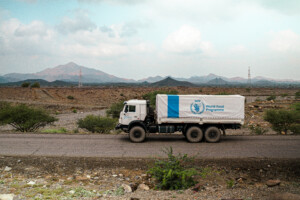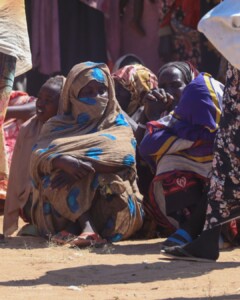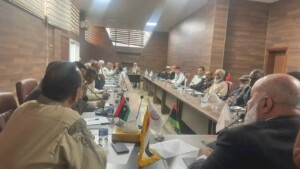Sudan OCHA bulletin 2: 1,000 people flee from violence in West Darfur
The UN Office for the Coordination of Humanitarian Affairs (OCHA) in Sudan reports in its latest weekly bulletin that humanitarian agencies will conduct a needs assessment and potential response to meet the needs of about 1,000 newly displaced villagers in the West Darfur capital El Geneina, as soon as the security situation on the ground allows.
The UN Office for the Coordination of Humanitarian Affairs (OCHA) in Sudan reports in its latest weekly bulletin that humanitarian agencies will conduct a needs assessment and potential response to meet the needs of about 1,000 newly displaced villagers in the West Darfur capital El Geneina, as soon as the security situation on the ground allows.
On 10 January, an estimated 1,000 people from Mouli village in West Darfur marched to the state capital following attacks by pastoralists. Government security forces dispersed the protesters. At least 12 people killed in the riots, according to media and other reports citing the Commissioner of El Geneina locality.
The UN received reports on 11 January, that these newly displaced people from Mouli moved to Abu Zar camp for the displaced in El Geneina town. OCHA and humanitarian partners are in the process of verifying this information amid the tense security situation in the area.
There have been reports that members from both tribes – the Beni Halba and the Massalit – are mobilising for another confrontation. Meanwhile, the Government of Sudan will set up a committee to probe the incident.
73,000 South Darfuris in need of health and WASH aid
Preliminary findings of an inter-agency assessment mission completed on 10 January to South Darfur’s Rahad El Berdi and Um Dafug areas have identified that an estimated 73,000 people are in need of water and sanitation as well as health assistance.
The people identified are displaced that have been arriving from Central Darfur since 2013, refugees who returned from the Central African Republic in 2014, and vulnerable people from the host community.
About 1,000 displaced return to Bindisi camp in Central Darfur
Aid organisations in Bindisi estimate that 1,000 people who fled Bindisi camp for the displaced following herders' attacks late December, have returned to the camp, after interventions from the Central Darfur governor's office and a reconciliation committee, which facilitated an agreement between the displaced people and the nomads.
The government’s Humanitarian Aid Commission (HAC), the international Triangle Génération Humanitaire and Catholic Relief Services assessed the needs of these people and identified them as emergency shelter and household supplies, food, water, and sanitation services.
South Sudan humanitarian corridor extended for six months
Sudan, South Sudan and the World Food Programme (WFP) signed an extension of the agreement on 10 January, on the transit of humanitarian aid via Sudan to South Sudan for another six months until 30 June 2016.
In July 2014, Juba and Khartoum signed a Memorandum of Understanding (MoU) to allow the transport of aid across borders and by river transport to feed thousands of affected civilians in South Sudan. A considerable part of South Sudanese civilians in need of assistance are located in Upper Nile, Jonglei and Unity states bordering on Sudan, with the delivery of aid supplies via Sudan easier logistically.
Since July 2014, WFP has delivered 27,000 metric tons (MT) of food assistance for an estimated 300,000 people in northern states of South Sudan through Sudan by road, river and air transport. The people in these areas mainly depend on food assistance delivered via this corridor.
UNHCR welcomes asylum application procedures in Khartoum
On 10 January, refugee status determination procedures were launched in Khartoum. These procedures will help urban asylum-seekers who qualify for an official refugee status and should have access to specific rights, according to the UN Refugee Agency (UNHCR).
This comes as a result of the recently enacted 2014 Asylum Act of Sudan, which underlined the right to seek asylum, including the possibility for recognised refugees to reside in urban areas in Sudan. The Act includes a number of provisions that promote the rights of refugees and asylum-seekers in the country, including the right to basic education and health services.
The Government of Sudan’s adoption of the 2014 Asylum Act, the 2014 Trafficking Act, as well as the ratification of the Palermo Protocol on Human Trafficking represent landmark developments for the legal framework for refugees and asylum-seekers in Sudan, the OCHA bulletin reads.
According to UNHCR, of the estimated 379,000 refugees and asylum-seekers in Sudan, between 70,000 and 75,000 are believed to be currently residing in Khartoum.
Dengue fever outbreak may be stabilising
The cumulative number of suspected dengue fever cases reported throughout Sudan over the past four months since the beginning of the outbreak on 29 August 2015 to 8 January stands at 573 cases, including 104 deaths. This indicates a case fatality rate (CFR) of 19 per cent, which is a significant drop from the 54 percent CFR at the beginning of the outbreak.
Darfur is the most affected region, accounting for 92 per cent of all reported cases (521 cases) and 95 percent of deaths (99 deaths). South Kordofan reported so far 46 cases and four deaths, and Kassala six cases and one death.
Read the OCHA bulletin here











 and then
and then